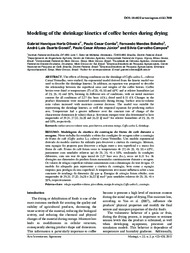Modeling of the shrinkage kinetics of coffee berries during drying.
Modeling of the shrinkage kinetics of coffee berries during drying.
Author(s): OLIVEIRA, G. H. H.; CORRÊA, P. C.; BOTELHO, F. M.; GONELI, A. L. D.; AFONSO JUNIOR, P. C.; CAMPOS, S. C.
Summary: The effects of drying conditions on the shrinkage of Coffea arabica L., cultivar Catuaí Vermelho, were studied. An exponential model derived from the kinetic model was used to describe the shrinkage kinetics. In addition, an equation was proposed to describe the relationship between the superficial areas and weights of the coffee berries. Coffee berries were dried at temperatures (T) of 35, 45, 55 and 65ºC and at relative humidities (φ) of 25, 35, 45 and 55%, forming 16 different sets of conditions, with an initial moisture content for all conditions of 2.27 dry basis (d.b.), dried until 0.11 d.b. Changes in the product dimensions were measured continuously during drying. Surface area-to-volume ratio values increased with moisture content decrease. The model was suitable for representing the shrinkage kinetics, as well the empirical equation for predicting surface area. Temperature had a greater influence over the constant rate of change of the characteristic dimension (k values) than φ. Activation energies were also determined to have magnitudes of 39.31, 37.32, 36.28 and 36.22 kJ mol-1 for relative humidities of 25, 35, 45 and 55%, respectively.
Publication year: 2011
Types of publication: Journal article
Observation
Some of Embrapa's publications are published as ePub files. To read them, use or download one of the following free software options to your computer or mobile device. Android: Google Play Books; IOS: iBooks; Windows and Linux: Calibre.
Access other publications
Access the Agricultural Research Database (BDPA) to consult Embrapa's full library collection and records.
Visit Embrapa Bookstore to purchase books and other publications sold by Embrapa.

